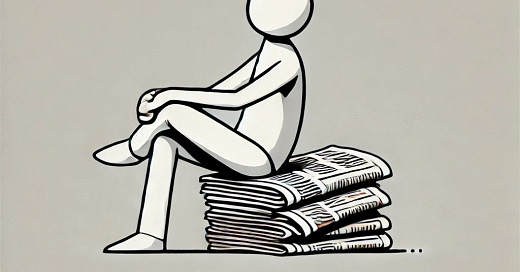Leo Tolstoy spent more than a decade working on a single book. It’s understandable, after all that work, that he considered it his greatest contribution to humanity. The surprising part is that it isn’t War and Peace, but the comparatively obscure A Calendar of Wisdom.
Each day of the Calendar features quotes from other writers and thinkers on a topic, paired with Tolstoy’s own aphoristic insights. The pithy wisdom is interesting to flip through, but the part that really caught my attention is an excerpt from Tolstoy’s diary, included in the preface to the edition I have. While working on A Calendar of Wisdom, Tolstoy wrote this in his diary:
“For two months I did not read anything else, neither newspapers nor magazines, and I felt so good….All our education should be directed to the accumulation of the cultural heritage of our ancestors, the best thinkers in the world.”
During that focused work time, Tolstoy restricted his reading to older sources, which he scoured for timeless wisdom. He took a break from the news in order to finish his project, but a side effect was that he felt better.
Thomas Jefferson expressed a similar sentiment late in life in a letter to John Adams. Jefferson wrote the letter when the “Founding frenemies” were repairing their relationship following a long estrangement, and after Jefferson retired from politics.1 “I have given up newspapers in exchange for Tacitus and Thucydides, for Newton and Euclid,” Jefferson wrote, “and I find myself much the happier.”
In each of the last two years, I’ve taken an extended break from the news — signed out of news and social media accounts — to read only stuff that is longer, slower, and usually older. Like Tolstoy, I was doing it so that I could concentrate my work on the book draft that I’m going to turn in any day now. And, like Tolstoy, I found myself happier, even though I hadn’t expected or even thought about that beforehand.
I’ve noticed a small trend among journalists I follow — writing about their own versions of news vacations. Amanda Ripley, the author of High Conflict (who I interviewed recently), wrote in 2022 about how she stopped reading the news after two decades as a news junkie. The news, she wrote, had become too constant, and too uniformly negative with too few “solutions stories,” and left her feeling hopeless and like she had a lack of agency in the world. “After my morning reading,” she wrote, “I felt so drained that I couldn’t write — or do anything creative.”2
Laura Hazard Owen, a journalist whose job is, in large part, to read and write about the news, recently wrote about lowering her own daily dosage of news. Constant checking of feeds had seeped beyond her work into family time. “If I read bad news while I’m with my kids,” she wrote, “my reaction to their normal kid behaviors is disproportionate; I find myself snapping at them over things that normally wouldn’t bother me.” Given her work, Hazard Owen cannot go dark on the news, but she deleted a social media account and is restricting the time of day when she’ll read news. She’s also limiting herself to reading news, and not other people’s reactions to news. “Articles,” as she put it, “are still significantly more finite and finish-able than social media reactions to them.”
Tolstoy and Jefferson didn’t even have to deal with the infinitude of reactions to news, and they still felt relief when they took a break from the flood of current events. I don’t think this means that we should abandon keeping up with the news. I think it would be disastrous if we all did that. (And I happen to have an extra-special place in my heart for local news.) But I think regular breaks are healthy, and helpful. As I prepare to turn in the first draft of my new book, I’m grateful that focusing on the project forced me into a few breaks from the news, and to turn to slower sources of information and wisdom. From now on, I plan to take a news vacation every year.
Thanks for reading. If you appreciated this post, please share it.
And if you’re not subscribed, you can do that here:
Until next time…
David
When they ran against each other for president, Adams’s side said that a Jefferson presidency would lead to open “murder, robbery, rape, and incest.” Jefferson’s side said that Adams comported himself neither like a man nor woman but “a hideous hermaphroditical character.”
Ripley’s comment here reminded me of my interview with psychologist Gloria Mark, author of the book Attention Span. Mark talked about how switching tasks leaves a “residue” on the brain that can make moving from checking news back to work difficult. In a subsequent interview, she told me that this is especially true for news with strong emotional content.







I so miss the days of just the morning paper and the evening news, which had primarily local and some global items.
The constant barrage of consumable 'news' and readers' reactions is definitely not human progress.
I have not watched TV news since the election, and only sparingly gotten my new from print since then. I definitely feel better. But I also worry about becoming an uninformed citizen. I'm struggling with what I have control over (in the news) and what my responsibility is, as a citizen.